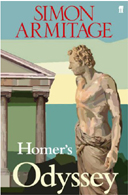Homer’s Odyssey, probably composed around 700BC, is one of the oldest poems in the western tradition, with a concomitantly long history of translation. The first into Latin was in the third century BC by a slave called Livius Andronicus. The first into English was by George Chapman in 1614-15; there have been at least 60 others. Now comes the first by a woman.
Emily Wilson’s crisp and musical version is a cultural landmark. Armed with a sharp, scholarly rigour, she has produced a translation that exposes centuries of masculinist readings of the poem. (Wilson studied classics at Balliol College, Oxford – as, full disclosure, did I – and is now a professor of classics at the University of Pennsylvania.) She has also written a work of limpid, fast-moving verse, in English epic’s home metre of iambic pentameter. This translation will change the way the poem is read in English. When Keats first looked into Chapman’s Homer, he felt like “some watcher of the skies / When a new planet swims into his ken”. So it is with Wilson’s Odyssey.
Here is the proem:
Tell me about a complicated man.
Muse, tell me how he wandered and was lost
when he had wrecked the holy town of Troy,
and where he went, and who he met, the pain
he suffered in the storms at sea, and how
he worked to save his life and bring his men
back home. He failed to keep them safe; poor fools,
they ate the Sun God’s cattle, and the god
kept them from home. Now goddess, child of Zeus,
tell the old story for our modern times.
Find the beginning.
Already Wilson has set out her stall: clarity and cleanness are her watchwords; her epic voice is not one of grandeur or pomposity. This represents an important decision, since the actual language of Homer, drawing as it did on an old, oral tradition of bardic poetry, used a hodgepodge of dialects and vocabulary that was archaic even by the time the poem was written down. She has chosen to foreground other qualities of the original: urgency and vigour (and sometimes, oddness – readers may be taken aback later in the poem to find Odysseus’s son Telemachus offered “canapés”, and Odysseus himself, when disguised as an old homeless man, carrying a “tote bag”).
The word Wilson has translated as “complicated” is polutropos, one of Homer’s regular epithets for Odysseus. It means, literally, “many turned” or “much turning”. It leads us to think of his duplicity, his cunning, his epic wanderings, his suffering, the things he does and things that are done to him on his journey home to Ithaca. “Complicated” comes from the Latin verb plico, which means to fold. Plico comes from the Greek pleko, one of whose meanings is devise or contrive; occasionally it means “to form the plot of a tragedy”. The deliciousness of the word “complicated” is that it suggests that the twists and turns have their darker aspects: this man has layers. Wilson’s translation is constantly alert to the cost of Odysseus’s homecoming. He slaughters his wife’s suitors and a dozen female slaves in order to regain his property and status. And he is the only man of his fleet to reach Ithaca alive. “He failed to keep them safe,” writes Wilson. “He could not save them from disaster,” is Robert Fagles’ version for Penguin. Chapman has: “But so their fates he could not overcome.” The Greek? “All’ oud’ hos hetairous erruasato” – “but even so he did not protect his companions”. Whereas male translations have a habit, perhaps quite unconsciously, of letting Odysseus off the hook (he tried his best! He just couldn’t manage it!), Wilson is more attentive to the poem’sfoldedness, its complexity.
Part of this complicatedness is its polyphonic nature. Wilson enjoys and attends to the poem’s ensemble cast, some of them intriguing women who can do great damage to men when they open their mouths: the Sirens, who might hold you in their grip for ever with their seductive song; Charybdis, who is just one giant whirlpool of a mouth that might consume you; even Penelope, who is not always to be trusted to speak, and is twice silenced by sharp words from her son. The poem contains foundational moments of misogyny, which Wilson does not soften, but is also rich and flexible enough to contain sophisticated female characters, notably Helen of Troy, now returned to her husband’s palace to become Helen of Sparta once more. She is certainly not to be quieted. She enters the poem just at the moment when her husband, Menelaus, has tactlessly made a visitor – young Telemachus – weep. “Shall I conceal my thoughts or speak?” she says. She does not wait for permission, but ploughs on, making clear that, unlike her husband, she has immediately recognised the boy, even though she last saw him “the day the Greeks marched off to Troy, their minds/fixated on the war and violence./ They made my face the cause that hounded them.” This last line is translated by Fagles as “shameless whore that I was”, and by Stephen Mitchell as “bitch that I was”. The Greek is kunopis, a rare word literally meaning dog-face, or dog-eye. There are few contexts in which to see this word in use, but it is applied by Euripides to the Furies, terrifying creatures that “hound” murderers. It does not carry, argues Wilson, the overtones of female sexual destructiveness that are often applied in its translation. And so another small but significant transformation is effected.
The poem is full of bloodshed and excitement, monsters and witches, plots and lies. It also contains passages of stillness and sheer delight. Here is Wilson’s translation of part of the description of the grove sheltering the nymph Calypso’s cave.
The scent of citrus and of brittle pine
Suffused the island. Inside, she was singing
And weaving with a shuttle made of gold.
Her voice was beautiful. Around the cave
A luscious forest flourished: alder, poplar,
And scented cypress.
A woman’s voice: how beautiful to hear it.
• The Odyssey is published by Norton. To order a copy for £30 go to bookshop.theguardian.com or call 0330 333 6846. Free UK p&p over £10, online orders only. Phone orders min p&p of £1.99.











